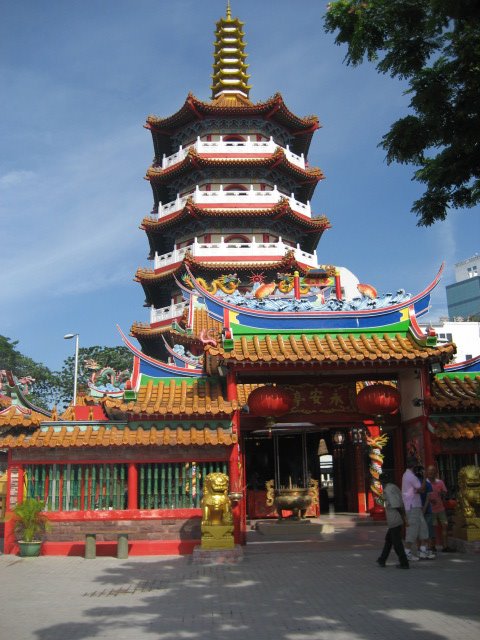The entire Sibu Central town can be leisurely explore by walking. A number of Sibu's heritage attractions can be discovered within the town proper.
Sibu Heritage Centre
Sibu Heritage Centre
This building has witnessed the transformation of Sarawak from a colony of the British to becoming an independent state by forming Malaysia in 1963. Sibu Heritage Centre was the original administration building of Sibu Municipal Council.
It was later refurbished as Sibu Heritage centre Museum. Its upper floor houses the Sibu heritage museum. The ground floor is a commercial belt. There is also a space for artwork exhibition.
Sibu Old Mosque (Masjid Lama Sibu)
This old mosque of Sibu has been here since 1883.Its first as a wooden structure was built by Tuan Haji Abdul Salam Minangkabau from Indonesia.
However, its structure was never changed; its original form remains intact.
Warriors Memorial site
Rosli Dhoby, born in Sibu, was an active member of one Sibu – based Malay Youth Movement (Gerakan Pemuda Melayu). On 3rd December, 1949 and at the age of 17 years Old, Rosli Dhoby led a group, codenamed the Rukun 13 (the Black Crow group).
They set off to assassinate the 2nd Gorvener of Sarawak, Mr. Duncan Steward. Rosli Dhoby and 3 others, namely Morshidi Sidek, Bujang Suntong and Awang Ramli Amit were arrested and hung. They were buried in Kuching on 2nd March, 1950. 46 years later, their remains were exhumed and brought back to Sibu.
They were re-buried at this Warriors Memorial Site on 2nd March, 1996. It is located next to the An-Nur Mosque at Jalan Awang Ramli Amit.
Oldest Muslim Cemetery (Sibu town Square phase 2)
This oldest Muslim cemetery site was estimated to have buried over 70 Muslims. However, the burial activity was stop during Japanese occupation in 1941. Over time, river bank erosion has caused some severe damages to the site. It was restored in 2003.
The two Angsana trees are said to be the temporary “Batu Nisan” or tombstones for one tomb. As most of the original tombstones were washed away, a memorial structure was later erected to commemorate it.
Lau King Howe Hospital Memorial Museum
Lau King Howe Hospital was built in the 1930's as the first general hospital Sibu. Its founder, the late Mr. Lau king Howe, donated his personal wealth to set it up. In appreciation, the colonial government named it Lau King Howe Hospital.
In 1994, the hospital was moved to a new site at Jalan Oya. Since then, Sibu hospital, with its much bigger capacity and better facilities, has replaced Lau King Howe Hospital. However, the site of Lau King Howe Hospital is preserved and turned into Lau King Howe Memorial Museum. This is made possible with the joint efforts of Lau's Clan Association, Sibu municipal Council and the Health Department.
Tua Pek Kong Temple

Eng Ann Tua Pek Kong of Sibu was founded around 1870. From the original wooden structure of a Chinese temple. It was rebuilt in 1897 into Taoist architecture building. Most of its building materials were imported from China including the statue of the host deity, Lord Tua Pek Kong.Like the other Tua Pek Kong temples in Sarawak, Eng Ann Teng Tua Pek Kong temple has met some major fire disasters in Sibu. But it did not suffer any damages. Even the Sibu big fire of March 8, 1928 which destroyed most of surrounding shop houses, left this temple unscathed.
Outskirts of Sibu
Ten minutes by road from the town center, the Sungai Merah Heritage Walk visits the site of the earliest Chinese settlements in Sibu. The pleasant walking trail along the river front (the water is really red, turning to yellow when the tide sets in) leads through a landscaped park to the Wong Nai Siong Memorial Garden, a site honouring the principal founder of Sibu. The Heritage Walk concludes with the James Hoover Memorial Park that commemorates the renowned Methodist missionary and educator who worked with Sibu's pioneering Foochow migrants from 1903 to the 1930s. Take a taxi or Sungei Merah Bus 1A.
James Hoover Memorial Square
This square is named after a great Methodist Missionary (from USA), Reverend James Matthew Hoover. Reverend Hoover was the first foreign pastor who served the Methodist Churches of Sibu. From 1903 to 1935, he had helped to build 41 churches and 40 schools all over Sibu. When the Fuzhou settlement pioneer, Mr. Wong Nai Siong, left Sibu in 1904, Rev. Hoover helped to manage the settlement. His contributions to the early development of Sibu were fondly and gratefully recognized.In addition, he created history and modernized Sibu by being the first person to pioneer the use of the following items to Sibu:
- The very first rubber seedlings (1904)
- The very first steam launch
- The very first rice huller (1906)
- The very first girls' school (1911)
- The very first generator (1912)
- The very first agricultural school (1913)
- The very first bicycle
- The very first ice making machine
- The very first circular saw
- The very first wireless telegraph machine
Sibu is the largest port and commercial centre in the Rejang Basin and the gateway to Central Sarawak. Located at the confluence of the Rejang and Igan Rivers, approximately 130 km from the South China Sea, Sibu is a thriving modern town with a vibrant center and a bustling, crowded waterfront.The residents of Sibu are predominantly Foochow Chinese, originating from the Fuzhou region of southern china, and the town is often referred to as New Fuzhou. However Sibu's ethnic mix is as varied as anywhere else in Borneo, with smaller proportions of other Chinese dialect groups - as well as Malays, Melanaus, Ibans and Orang Ulus - making the town their home.Sibu is easily accessible by road from all parts of Sarawak. Direct air links connect Sibu to Kuala Lumpur and the major towns and cities in Sarawak and Sabah.
Sarawak... Where Adventure Lives